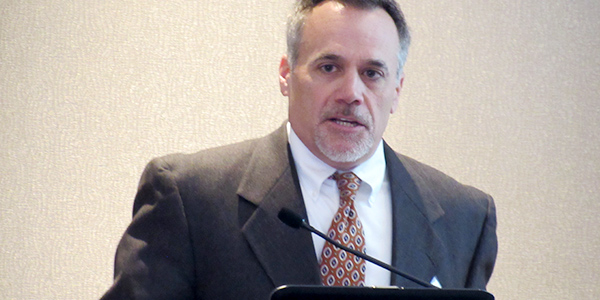By Amanda Durish Cook
The Organization of MISO States will examine the revolving door policies of its member states after its president departed his position earlier this month to take a job with a wind energy trade association.
The move comes in response to Louisiana Public Service Commissioner Eric Skrmetta’s call to create a code of conduct among OMS representatives — all of whom are state utility commissioners — governing how they transition into jobs in the industry they regulate.
“We’re asking for the OMS to consider adopting a code of ethics or a code of conduct policy,” Skrmetta told fellow regulators during a Board of Directors meeting Nov. 19 as part of the National Association of Regulatory Utility Commissioners’ annual meeting in San Antonio.
OMS leaders said the organization will begin the effort by examining state rules on post-employment restrictions before it decides to move forward with developing any policy.
Skrmetta said he was raising the issue after former OMS President and Missouri Public Service Commissioner Daniel Hall left both posts to become the central region director for the American Wind Energy Association earlier this month. Skrmetta said he took issue with the fact that there was no downtime before the transition and that the move wasn’t announced ahead of time.
“The turnaround is instantaneous,” he said. “It’s pretty obvious we have to take some steps.”
OMS Executive Director Marcus Hawkins said the board was aware of Hall’s plans to leave the organization about a month before his departure. Hall did not respond to RTO Insider’s request for comment.
“Avoiding the appearance of impropriety is an important goal for this body,” Skrmetta said. He suggested OMS adopt a recusal mechanism or require members to disclose extracurricular tasks that might conflict with the aims of their offices.
Kentucky Public Service Commissioner Talina Mathews suggested OMS begin the effort by taking inventory and comparing each state’s existing code of ethics on post-employment policies, a task the board assigned to an informal board subcommittee.
But even that first step prompted pushback from other regulators.
Wisconsin Public Service Commissioner Mike Huebsch said he wasn’t certain cooling-off periods are constitutional. He argued requiring cooling-off periods negatively affects former commissioners’ ability to find jobs after their terms end, an already daunting task.
“It’s a tough thing because most of us can’t talk to anyone until we leave the state,” Huebsch said.
“There had to be some knowledge of the employment coming. … There has to be some acknowledgement that that’s going to happen, and there has to be some kind of drawing back,” Skrmetta responded.
Skrmetta said initiating a code of conduct would create protections for OMS and create an “absolute armor plate” for the organization. He also argued that as AWEA’s central region director, Hall was active in MISO states immediately after leaving OMS.
“Daniel Hall took certain views in his office, and those views haven’t changed. There was no influence,” Arkansas Public Service Commission Chairman Ted Thomas argued. “You can talk about motivations, but you can’t really separate it.”
Thomas suggested OMS might add some boilerplate language that directors are bound to their state’s individual code of ethics.
But Huebsch said state law and guidelines differ so drastically among states it would be impossible to create a single code of ethics for members.
“There are things I could do in other states that would put me in jail in Wisconsin. And vice versa,” he said.
OMS President Matt Schuerger asked the subcommittee to wrap up its research in time for the board’s January meeting.
“It’s a reasonable question that’s been put before us,” he said, promising more discussion.




